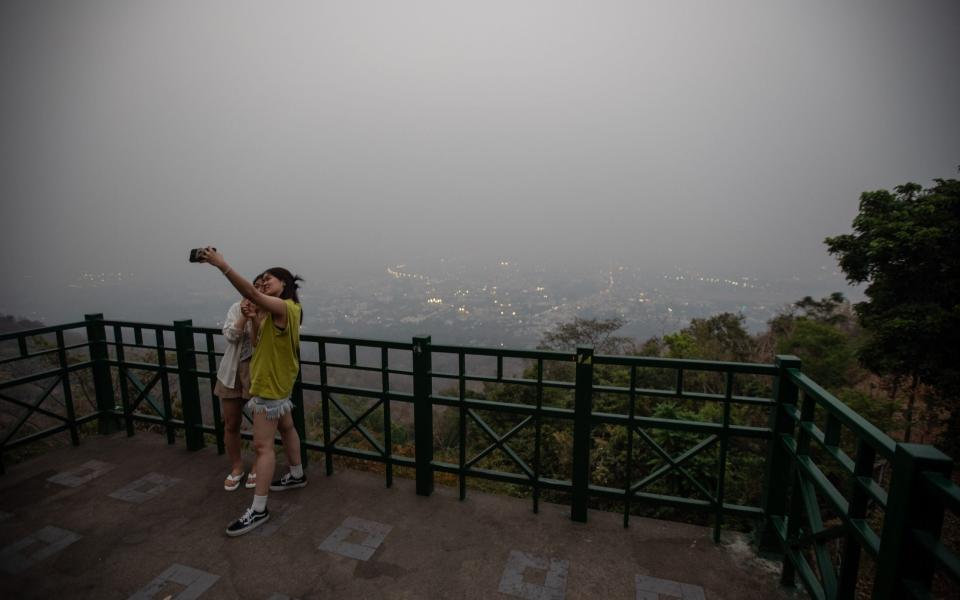Six years ago this April, I lay on the stage of a village hall on the outskirts of Chiang Mai while an old man massaged my back with his burning feet.
Known as yam kang, this practice is one of the unconventional treatments found in and around the Thai city of Chiang Mai, where mental and physical health are as intertwined with culture as the roots of a banyan tree.
Considered one of the world’s largest wellness destinations along with Bali, Goa and Rishikesh, Chiang Mai is home to more than 300 working Buddhist temples, hundreds of massage centres, dozens of yoga centers and a leading traditional Thai medical school. Dr. from Chiang Mai University Faculty of Medicine.
When you factor in the idyllic countryside with hiking trails, elephant reserves and river rafting, it’s easy to see why this is a health destination. But an important part of any spa holiday is the ability to breathe; It’s very difficult to do that in Chiang Mai right now.
Tourists and the long-suffering local population of about 120,000 are now withering under pollution levels more than 20 times higher than World Health Organization (WHO) recommendations. Chiang Mai has regularly topped the charts as the world’s most polluted city for the past few weeks, surpassing Delhi, Kolkata and Lahore, according to global air monitoring site IQAir.
The concentration of harmful PM 2.5 particles (2.5 micrometers in diameter or smaller) in the atmosphere rose to 136.2 micrograms per cubic meter at the beginning of this month. To provide some context, the reading in London is currently 6.2, with the World Health Organisation’s recommended safe daily maximum being 25.

Scientists suggested that spending time in such a polluted environment is equivalent to smoking two packs of cigarettes a day.
Why is semi-rural Chiang Mai suffering so much? ‘Burning season’ is a man-made environmental disaster that occurs between early February and late April each year, when farmers, mostly large agribusinesses, use fire to clear land for the next sugarcane or rice crop cycle.
While the practice has been going on for many years, experts say the intensity and duration of the burning season are worsening.
Not so long ago, spring was one of the best times to visit northwestern Thailand due to low humidity, little rainfall and cool nights; now it is a time when the historic city, its golden stupas and the surrounding countryside are bathed in a thick grey. smoke cover that endangers health.
“These figures (PM2.5 and PM10) sound harmless, but most people don’t realize that these are very small particles that are impossible not to inhale,” explains building environmental expert John Herbert. “If you are exposed to these levels for a long period of time, even for several months, you will face serious respiratory disorders and possibly hospitalization.”
Short-term visitors may also be affected; Tourists report cases of itchy eyes, nose irritation, skin rashes and breathing difficulties. “I would advise people not to go on holiday [to Chiang Mai] at this time of year,” adds Herbert.
“Particularly the very young (children are 10 times more vulnerable) or those with weakened immune systems, asthma or other respiratory problems. Health and PM2.5 readings over 200 [as has been seen in Chiang Mai] “There is a clear mismatch.”


Safety recommendations for visitors include reducing outdoor exercise, keeping windows closed, wearing masks and running air purifiers; This is not very suitable for a spa holiday.
“Our city’s recent ranking as the most polluted city and media coverage have undoubtedly affected our business,” says Anchalika Kijkanakorn, founder and managing director of AKARYN Hotel Group, which recently opened Aleenta Retreat Chiang Mai. An idyllic teak-roofed escape on the city’s forested edge, offering traditional Thai therapies and state-of-the-art amenities.
“As a hotel focused on seclusion and wellness, our guests are informed about pollution and actively avoid visiting at this time of year. But to alleviate concerns [of those that do] “In addition to our guest rooms, we have equipped our spa, gym and bar with air purifiers and are providing masks to both guests and staff.”
Improvements are promised. Concerns about both the long-term health of local people and the detrimental impact on tourism eventually led Prime Minister Srettha Thavisin’s government to pass the Clean Air Act in January. Last week, Chiang Mai governor Nirat Phongsitthithawon proposed a shorter-term solution, ordering authorities to use air purifiers to create fresh air rooms that would allow locals to temporarily rest.
However, although current levels have not reached the very high toxicity level recorded in 2023, many believe more decisive action is needed to support farmers and stop crops burning.
Until that day comes, the toxic clouds that ravage the city will re-emerge every year, putting the lives and livelihoods of northern Thais and visitors at risk.